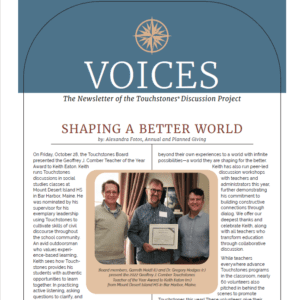Our History
In 1984, three life-long educators developed Touchstones to address gaps and barriers to students’ full participation and engagement in classroom dialogue. Howard Zeiderman, Nicholas Maistrellis, and Geoffrey Comber recognized, year after year, that their students demonstrated under-developed skills of civil discourse, critical thinking, and collaboration.
In their all-seminar classes at St. John’s College in Annapolis, Maryland, where they had taught for decades, they saw repeated patterns of student engagement: 25% were prepared and active in discussion, 25% were reticent participants or entirely silent, and 50% were variously in or out and unpredictable. Why, they wondered, were these patterns of behavior replicated and persistent, even in an entirely discussion-based environment? And why were these same patterns present in community meetings, board rooms, business team, and so many other settings they observed?
The Touchstones Discussion Project emerged from their investigations into the barriers that hinder inclusive discussion. These barriers include invisible power structures and dynamics operating in every culture and society and reinforce who or what is understood to be legitimate, valued, or respected and why. Zeiderman, Maistrellis, and Comber set out to create programs in which all students develop a voice, show respect for themselves and others, and assume responsibility for the quality and outcomes in their individual and collective learning.
Touchstones’ transformative programs complement traditional instructional approaches by elevating student-thinking and reciprocal teaching and learning as a central activity in the classroom.
What are people saying about Touchstones?
“What I find particularly valuable about Touchstones is that it helps students see their own opinions not as unalterable statements of identity, but as the products of their reflections, experiences and circumstances. This understanding helps students think critically and thoughtfully, and see disagreement as a means of promoting inquiry and a shared exploration of ideas.”
L. Morgan
The Griffin School (HS), Austin, TX
“I have used Touchstones for around 6 years now, with hundreds of students. Touchstones fundamentally changed my classroom dynamic… Recently I have come to value more how Touchstones gives an opportunity to practice conversation in a more “real-world” environment—because honestly, who raises their hand to be called on in a business meeting, or for that matter, anywhere except in a traditional classroom?”
C. Shryock
Teacher, Bishop McNamara High School, Forestville, MD



 Join the
Join the